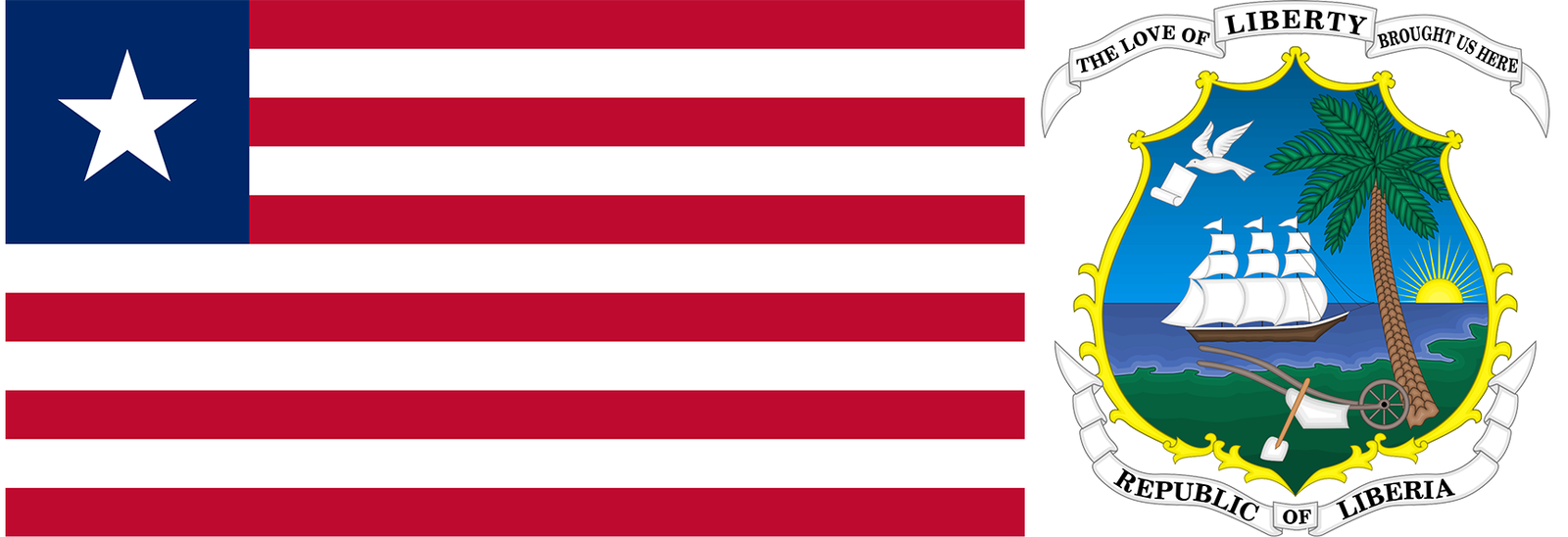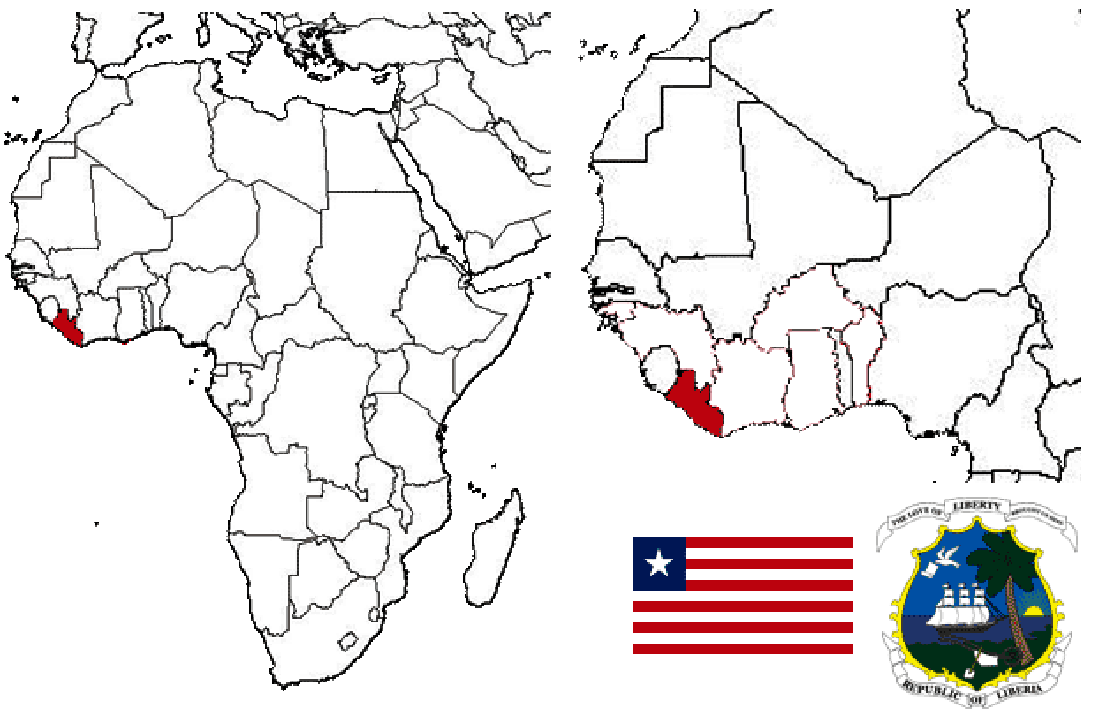FabulousFusionFood's Liberian recipes Home Page
 The flag of Liberia (left) and the Coat of Arms (right).
The flag of Liberia (left) and the Coat of Arms (right).
Welcome to the summary page for FabulousFusionFood's Liberian recipes, part of the African Continent. This page provides links to all the Liberian recipes presented on this site, with 37 recipes in total.
Liberia; officially: the Republic of Liberia (whose name literally means: 'The Land of the Free') was founded as an independent nation with support of the American government, for free-born and formerly enslaved Blacks and thus, is only one of two nations in Africa (along with Ethiopia) that didn't fall under European domination.
Rice is by far the most important staple of Liberian cuisine and this agricultural nation produces the staples: rice, cassava, bananas, citrus fruit, plantains and coconut. In addition, other important ingredients of Liberian cuisine include sweet potatoes, yams, cocoyam, plantains, mangos, pineapples and various sorts of nuts and peanuts, which are used in almost all deserts. Fish is an important aspect of the diet but meat is not used much and where employed is used more as a flavouring rather than a main ingredient. Of all West African cuisines Liberian recipes are probably the most heavily spiced, with cinnamon, cloves, mint or nutmeg and all kinds of chilli variants being employed. Liberian cuisine is also the West African cuisine with the longest tradition of baking and the production of desserts and cakes.
Liberia, officially the Republic of Liberia, is a country on the West African coast. It is bordered by Sierra Leone to its northwest, Guinea to its north, Ivory Coast to its east, and the Atlantic Ocean to its south and southwest. It has a population of around 5.5 million and covers an area of 43,000 square miles (111,369 km2). The official language is English. Over 20 indigenous languages are spoken, reflecting the country's ethnic and cultural diversity. The capital and largest city is Monrovia.
 The image above shows Liberia in (red) in relation to Africa (left) and
The image above shows Liberia in (red) in relation to Africa (left) and
West Africa (right).Liberia began in the early 19th century as a project of the American Colonization Society (ACS), which believed that black people would face better chances for freedom and prosperity in Africa than in the United States. Between 1822 and the outbreak of the American Civil War in 1861, more than 15,000 freed and free-born African Americans, along with 3,198 Afro-Caribbeans, relocated to Liberia. Gradually developing an Americo-Liberian identity, the settlers carried their culture and tradition with them while colonizing the indigenous population. Led by the Americo-Liberians, Liberia declared independence on July 26, 1847, which the U.S. did not recognize until February 5, 1862.
Liberia was the first African republic to proclaim its independence and is Africa's first and oldest modern republic. Along with Ethiopia, it was one of the two African countries to maintain its sovereignty and independence during the European colonial 'Scramble for Africa'. During World War II, Liberia supported the U.S. war effort against Nazi Germany and in turn received considerable American investment in infrastructure, which aided the country's wealth and development. President William Tubman encouraged economic and political changes that heightened the country's prosperity and international profile; Liberia was a founding member of the League of Nations, United Nations, and the Organisation of African Unity.
The Americo-Liberian settlers did not relate well to the indigenous peoples they encountered. Colonial settlements were raided by the Kru and Grebo from their inland chiefdoms. Americo-Liberians formed into a small elite that held disproportionate political power, while indigenous Africans were excluded from birthright citizenship in their own land until 1904.
In 1980, political tensions from the rule of William R. Tolbert resulted in a military coup, marking the end of Americo-Liberian rule and the seizure of power of Liberia's first indigenous leader, Samuel Doe. Establishing a dictatorial regime, Doe was assassinated in 1990 in the context of the First Liberian Civil War which ran from 1989 until 1997 with the election of rebel leader Charles Taylor as president. In 1998, the Second Liberian Civil War erupted against his own dictatorship, and Taylor was overthrown by the end of the war in 2003. The two wars resulted in the deaths of 250,000 people (about 8% of the population) and the displacement of many more, with Liberia's economy shrinking by 90%. A peace agreement in 2003 led to democratic elections in 2005. The country has remained relatively stable since then.
Liberia; officially: the Republic of Liberia (whose name literally means: 'The Land of the Free') was founded as an independent nation with support of the American government, for free-born and formerly enslaved Blacks and thus, is only one of two nations in Africa (along with Ethiopia) that didn't fall under European domination.
Rice is by far the most important staple of Liberian cuisine and this agricultural nation produces the staples: rice, cassava, bananas, citrus fruit, plantains and coconut. In addition, other important ingredients of Liberian cuisine include sweet potatoes, yams, cocoyam, plantains, mangos, pineapples and various sorts of nuts and peanuts, which are used in almost all deserts. Fish is an important aspect of the diet but meat is not used much and where employed is used more as a flavouring rather than a main ingredient. Of all West African cuisines Liberian recipes are probably the most heavily spiced, with cinnamon, cloves, mint or nutmeg and all kinds of chilli variants being employed. Liberian cuisine is also the West African cuisine with the longest tradition of baking and the production of desserts and cakes.
Liberia, officially the Republic of Liberia, is a country on the West African coast. It is bordered by Sierra Leone to its northwest, Guinea to its north, Ivory Coast to its east, and the Atlantic Ocean to its south and southwest. It has a population of around 5.5 million and covers an area of 43,000 square miles (111,369 km2). The official language is English. Over 20 indigenous languages are spoken, reflecting the country's ethnic and cultural diversity. The capital and largest city is Monrovia.
 The image above shows Liberia in (red) in relation to Africa (left) and
The image above shows Liberia in (red) in relation to Africa (left) andWest Africa (right).
Liberia was the first African republic to proclaim its independence and is Africa's first and oldest modern republic. Along with Ethiopia, it was one of the two African countries to maintain its sovereignty and independence during the European colonial 'Scramble for Africa'. During World War II, Liberia supported the U.S. war effort against Nazi Germany and in turn received considerable American investment in infrastructure, which aided the country's wealth and development. President William Tubman encouraged economic and political changes that heightened the country's prosperity and international profile; Liberia was a founding member of the League of Nations, United Nations, and the Organisation of African Unity.
The Americo-Liberian settlers did not relate well to the indigenous peoples they encountered. Colonial settlements were raided by the Kru and Grebo from their inland chiefdoms. Americo-Liberians formed into a small elite that held disproportionate political power, while indigenous Africans were excluded from birthright citizenship in their own land until 1904.
In 1980, political tensions from the rule of William R. Tolbert resulted in a military coup, marking the end of Americo-Liberian rule and the seizure of power of Liberia's first indigenous leader, Samuel Doe. Establishing a dictatorial regime, Doe was assassinated in 1990 in the context of the First Liberian Civil War which ran from 1989 until 1997 with the election of rebel leader Charles Taylor as president. In 1998, the Second Liberian Civil War erupted against his own dictatorship, and Taylor was overthrown by the end of the war in 2003. The two wars resulted in the deaths of 250,000 people (about 8% of the population) and the displacement of many more, with Liberia's economy shrinking by 90%. A peace agreement in 2003 led to democratic elections in 2005. The country has remained relatively stable since then.
Liberian Cuisine
Liberian cuisine heavily incorporates rice, the country's staple food. Other ingredients include cassava, fish, bananas, citrus fruit, plantains, coconut, okra and sweet potatoes. Heavy stews spiced with habanero and scotch bonnet chilies are popular and eaten with fufu. Liberia also has a tradition of baking imported from the United States that is unique in West AfricaThe alphabetical list of all Liberian recipes on this site follows, (limited to 100 recipes per page). There are 37 recipes in total:
Page 1 of 1
Page 1 of 1